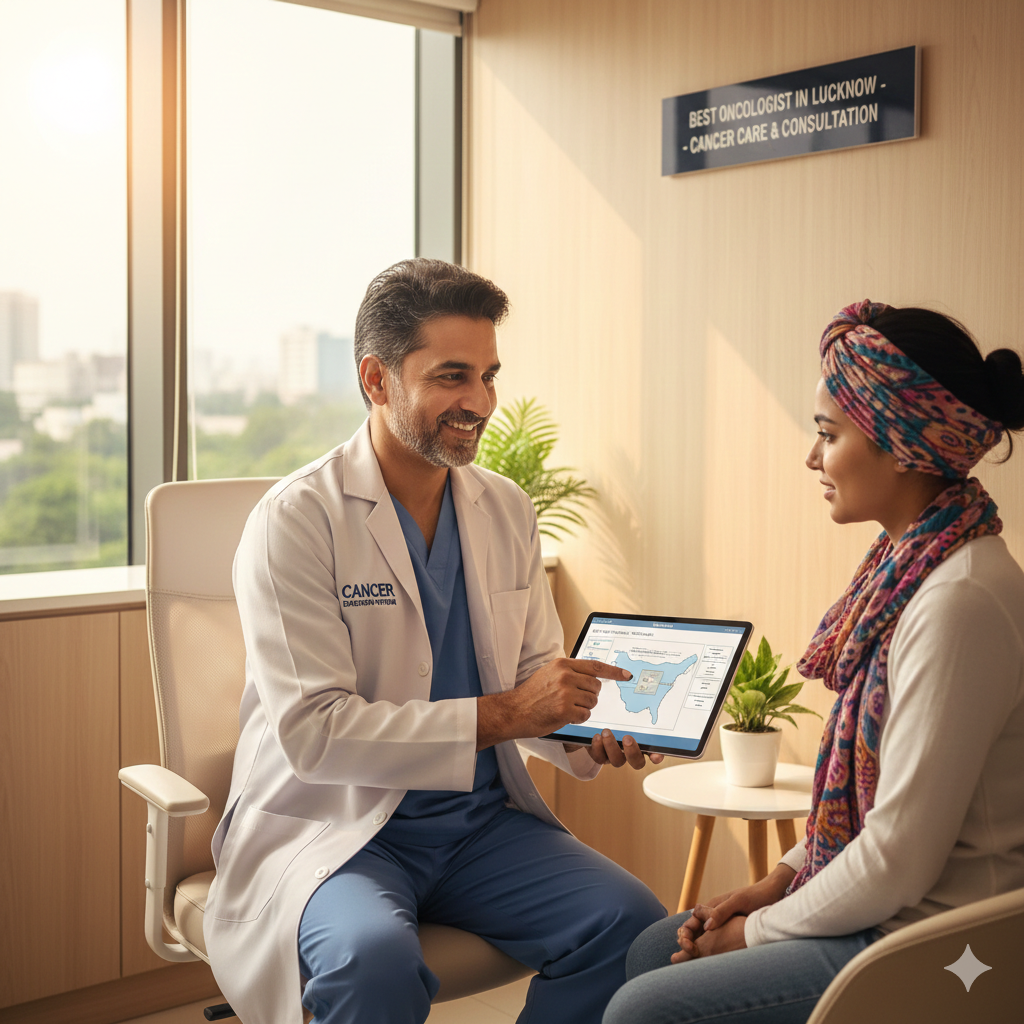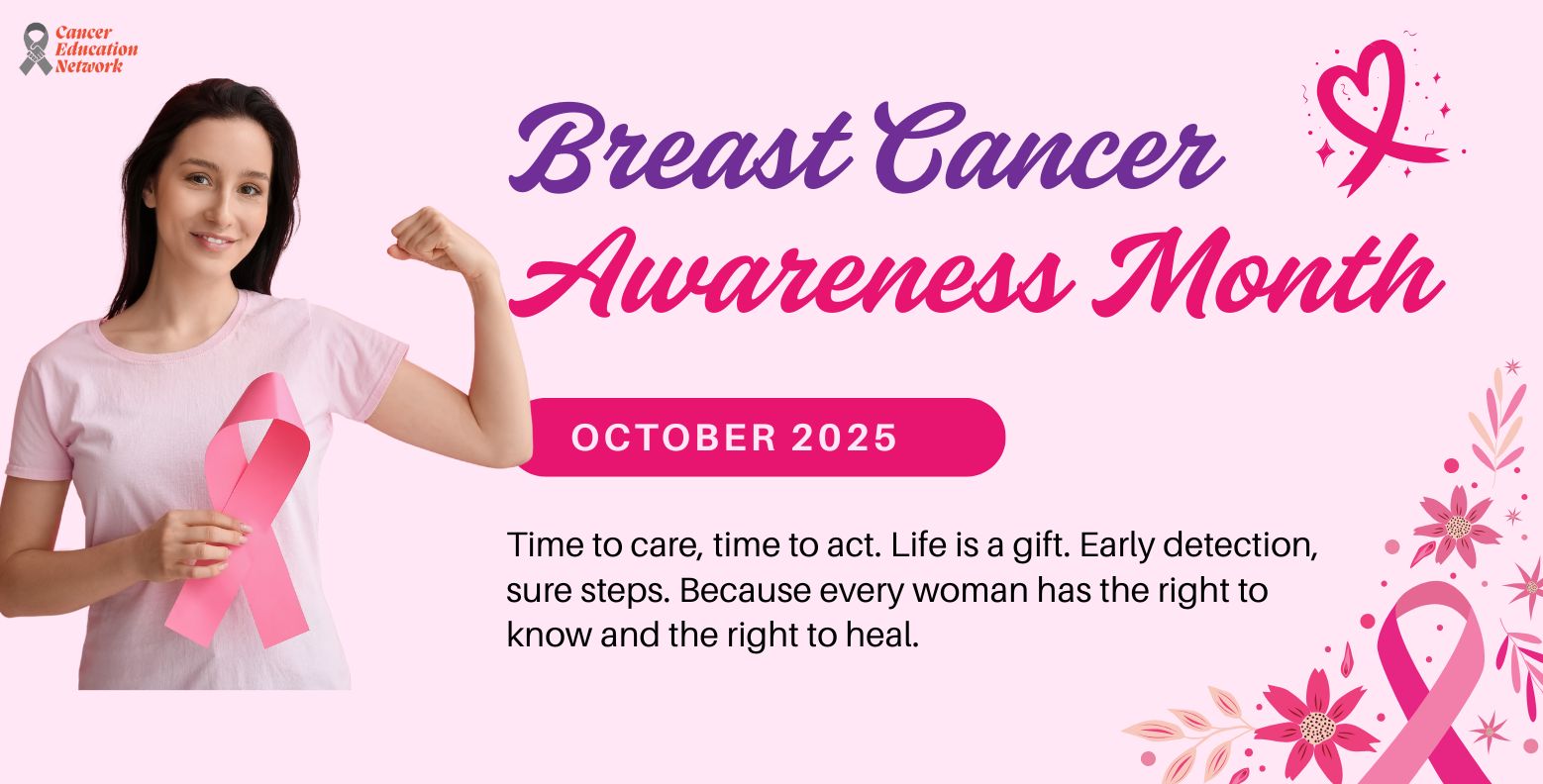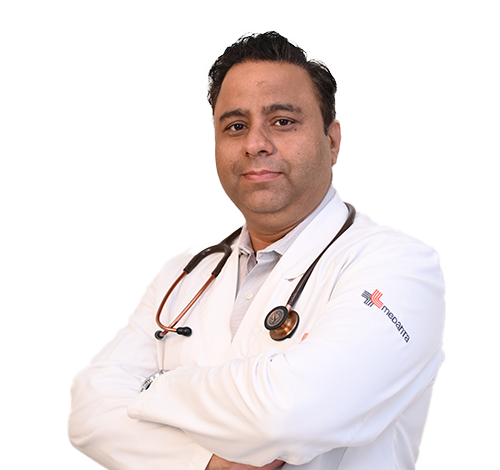Breast cancer is the most common cancer affecting women worldwide, though men can also develop it. Early detection offers a very high chance of long-term survival. Yet many delay screening or overlook subtle warning signs, limiting treatment options and affecting outcomes. On cancereducationnetwork.com, we believe informed patients make stronger decisions—so this guide is for you and your loved ones. If you’re in Lucknow and seeking expert care, you should know about the, breast cancer specialist in Lucknow – Dr. Harshvardhan Atreya.
What Is Breast Cancer?
Breast cancer occurs when breast cells begin growing abnormally, forming a lump or mass. While many cancers start in the milk ducts (ductal carcinoma), some begin in the lobules (lobular carcinoma) or other breast tissues.
These malignant cells can break through their original location, invade nearby tissues, and travel via lymphatic or blood vessels to distant organs in a process called metastasis.
Breast cancer affects both women and men, though far less common in men. Familiarity with risk factors, symptoms, and treatment options empowers patients to act early.
Types of Breast Cancer
Breast cancer is not one disease—but many, distinguished by location, behavior, and molecular traits:
Ductal Carcinoma In Situ (DCIS)
Non-invasive, confined to the milk ducts. It doesn’t spread, but may progress to invasive cancer if untreated.
Invasive Ductal Carcinoma (IDC)
The most common form (≈ 70–80% of cases). It begins in the ducts, then invades the surrounding breast tissue and possibly the lymph nodes.
Invasive Lobular Carcinoma (ILC)
Starts in lobules and can invade nearby tissues. It may be harder to detect on imaging because it can grow in a less consolidated pattern.
Inflammatory Breast Cancer (IBC)
Aggressive and fast-growing. Instead of forming a distinct lump, it causes redness, swelling, and skin changes as cancer cells block lymph vessels.
Triple-Negative Breast Cancer (TNBC)
Lacks oestrogen receptors, progesterone receptors, and HER2 protein. Because it doesn’t respond to hormone or HER2-targeted therapy, it often behaves more aggressively.
HER2-Positive Breast Cancer
Has excess HER2 protein, which fuels growth. It tends to be more aggressive but often responds well to HER2-targeted treatments.
Hormone Receptor-Positive Breast Cancer
These cancers grow in response to oestrogen (ER-positive) or progesterone (PR-positive). They are among the more treatable types, thanks to hormone therapies.
Paget’s Disease of the Nipple
Begins in the ductal tissue and spreads to the nipple skin. Symptoms include itching, flaking, or discharge; they are often associated with underlying DCIS or IDC.
Phyllodes Tumours
Rare tumours of the breast’s connective tissue. They may be benign, borderline, or malignant, and tend to grow rapidly.
Male Breast Cancer
Rare, often manifesting as invasive ductal carcinoma in men. Because it’s less expected, diagnosis is often delayed.
What Causes Breast Cancer & Who Is at Risk?
The exact cause is typically unknown. Breast cancer develops through a mix of genetic, hormonal, and environmental influences. Below are known risk factors:
Genetic Mutations
Inherited mutations—especially BRCA1 and BRCA2—play a significant role. People with family histories of breast or ovarian cancer may consider genetic counselling.
Hormonal Influence
Prolonged exposure to oestrogen and progesterone increases risk. Early menstruation, late menopause, or long-term hormone replacement therapy contribute to this risk.
Age & Cellular Damage
Risk rises with age, as more DNA damage accumulates in breast cells over time.
Lifestyle & Environmental Factors
Some modifiable factors include:
- Obesity, especially after menopause
- Alcohol consumption
- Cigarette smoking
- Sedentary lifestyle
- Previous chest radiation exposure
- Dense breast tissue
Reproductive & Other Factors - Menopause after age 55
- First child after age 30 or no children
- First menstruation before age 12
- Certain non-cancerous breast conditions (e.g., atypical hyperplasia)
Having one or more of these risk factors doesn’t guarantee you’ll develop breast cancer—but it means you should pay attention and possibly undergo closer monitoring.
Signs & Symptoms to Watch For
Early breast cancer may not cause any symptoms, but as it progresses, these changes might appear:
A lump in the breast or armpit (often painless)
- Change in breast shape, size, or contour
- Persistent breast or nipple pain
- Skin dimpling, puckering, or indentation
- Redness, warmth, or swelling of the breast
- Nipple inversion or flattening
- Unexplained nipple discharge (especially if bloody)
- Thickening, flaking, scaling, or peeling of breast or nipple skin
- Swelling of all or part of the breast
- Enlarged lymph nodes under the arm or near the collarbone
Never ignore a new change—early evaluation by a specialist makes a difference.

How Is Breast Cancer Diagnosed?
Diagnosis relies on a combination of examination, imaging, and tissue testing:
Imaging Tests
- Mammography: Low-dose X-ray imaging of the breast, often the first test.
- Ultrasound: Helps distinguish between a solid mass and a fluid-filled cyst.
- MRI: Provides high-resolution views, especially useful in dense breasts or unclear findings.
Biopsy
If imaging raises concern, a tissue sample is taken to confirm cancer:
- Fine-needle aspiration
- Core needle biopsy
- Surgical (open) biopsy
Biomarker Testing
If cancer is confirmed, the tumour is tested for hormone receptors (ER/PR) and HER2 status. This helps guide treatment planning.
Lymph Node Assessment
Nearby lymph nodes (especially in the armpit) may also be biopsied to check for spread.
Staging Breast Cancer
Staging describes how far cancer has progressed—information that guides treatment decisions and prognosis. The standard staging (TNM system) accounts for tumour size (T), nodal involvement (N), and metastasis (M):
- Stage 0: Carcinoma in situ (non-invasive)
- Stage I: Small invasive tumour, minimal or no lymph node involvement
- Stage II: Larger tumour and/or spread to nearby lymph nodes
- Stage III: Locally advanced disease, possibly involving the chest wall or skin
- Stage IV: Metastatic cancer has spread to distant organs
Treatment Options for Breast Cancer
Treatment depends on cancer type, stage, biomarkers, and patient health. Usually, a multidisciplinary approach is used, combining one or more of the following:
Surgery
- Lumpectomy: Removes tumour plus a margin; often followed by radiation
- Mastectomy: Removes the entire breast. Reconstruction may be immediate or delayed
- Lymph node surgery (sentinel node biopsy or axillary dissection)
Radiation Therapy
High-energy X-rays target residual cancer cells after surgery. Typically used post-lumpectomy and sometimes after mastectomy in high-risk patients.
Chemotherapy
Systemic therapy to kill cancer cells throughout the body. It may be given:
- Neoadjuvant (before surgery) to shrink tumours
- Adjuvant (after surgery) to eliminate residual disease
Side effects can include hair loss, fatigue, nausea, and susceptibility to infections.
Hormone (Endocrine) Therapy
Used in hormone receptor–positive cancers. Options include medications that block hormone receptors or lower hormone levels (e.g., tamoxifen, aromatase inhibitors). Usually continued for several years.
Targeted Therapy
Drugs that act on specific molecules (e.g., HER2) involved in cancer growth. These may be combined with chemotherapy.
Immunotherapy
Boosts the immune system to attack cancer cells. It is used in select cases (e.g., triple-negative breast cancers with certain markers). Often given alongside other therapies.
Can Breast Cancer Be Prevented?
There’s no fail-safe prevention, but risk can be reduced. Here are evidence-based strategies:
- Maintain a healthy weight
- Stay physically active (≥ 30 minutes most days)
- Limit or avoid alcohol
- Don’t smoke
- Breastfeed, if possible
- Use hormone therapy cautiously after menopause
- Know your family history and consider genetic counselling
- Talk to your specialist about preventive medications or surgery if you are high risk
- Undergo regular screening (mammograms, clinical breast exams)
- Be breast-aware: know how your breasts normally look and feel
Why Choose the Best Cancer Specialist in Lucknow?
When breast cancer is suspected or confirmed, selecting the right specialist matters. On Cancereducationnetwork.com, we highlight Dr. Harshvardhan Atreya as a top name in oncology and breast cancer care. As a cancer specialist and widely regarded as the best oncologist in Lucknow – Dr. Harshvardhan Atreya, he brings advanced expertise, compassionate care, and personalized treatment planning to patients across Lucknow and beyond.
If you notice any of the symptoms mentioned or have concerns, don’t wait. Early evaluation by an expert—the best cancer specialist in Lucknow—can help you get the most effective options.
Final Thoughts
Breast cancer is a serious disease, but in many cases, early detection and tailored treatment lead to excellent outcomes. Knowledge is your strongest tool. We hope this guide helps you and your family understand what breast cancer is, how it behaves, and what you can do next.
If you are in Lucknow and looking for the best care, schedule a consultation with Dr. Harshvardhan Atreya, breast cancer specialist in Lucknow, to discuss screening, diagnosis, or treatment options.
Disclaimer: This article is for educational purposes only. It does not substitute medical advice. Always consult a qualified healthcare provider for personalized guidance.
Frequently Asked Questions (FAQs)
- Can men get breast cancer?
Yes, although it is rare, men can also develop breast cancer. - Is every breast lump cancer?
No. Many lumps are benign (not cancer), but all lumps should be checked by a doctor. - At what age should women start breast cancer screening?
Generally, mammograms are recommended from age 40, but earlier if you have high risk. - Is breast cancer hereditary?
Yes, certain genetic mutations (like BRCA1 and BRCA2) can increase risk. - Can lifestyle changes reduce breast cancer risk?
Yes. Maintaining a healthy weight, exercising, and avoiding alcohol and smoking can help. - What is the survival rate of breast cancer?
If detected early, the 5-year survival rate is nearly 100%. - Where can I find the best treatment in Lucknow?
You can consult Dr. HarshVardhan Atreya, widely known as the breast cancer specialist in Lucknow, for advanced and personalized cancer care.












